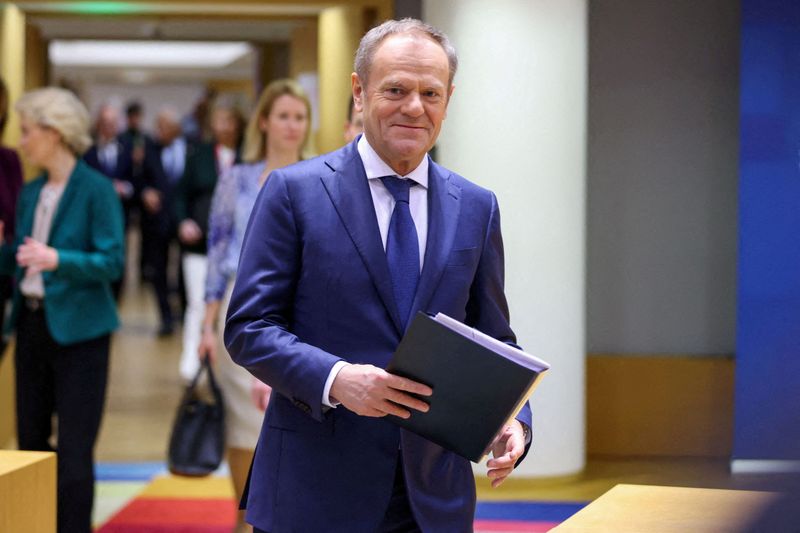WARSAW (Reuters) – With a little more than two years left to spend European Union recovery money, Poland is focusing firmly on making the most of the smaller grants leg of the programme, while treating cheap loans as a fallback component, a senior official told Reuters.
After years of haggling with the previous nationalist government in Warsaw over democratic norms, in February the European Commission released 137 billion euros of funds to modernise central Europe’s biggest economy, which narrowly avoided an inflation-driven downturn in 2023.
The funds include nearly 60 billion euros designed to help EU countries bounce back from the COVID-19 pandemic and energy transition, consisting of 25.3 billion euros in grants and 34.5 billion euros in cheap loans. Poland is expected to receive 6 billion euros from recovery funds on Monday.
While Warsaw was locked in a rule-of-law debate with Brussels, fellow EU members forged ahead with required reforms and investments, but even some countries accessing the funds from the start have fallen behind in commissioning projects.
Late last month, the Commission warned Romania, which has received by far the largest amount of the COVID-19 recovery funds in central Europe so far, that it was slipping on its reform agenda, putting billions of funding at risk.
Prime Minister Donald Tusk’s pro-EU government, which took power in December, is revising Poland’s national reconstruction plan listing projects and reforms, which it aims to submit to Brussels for approval this month.
“It is an absolute priority to use the grant part. It’s not free money, but if there’s anything close to free money, this is it,” Jan Szyszko, Deputy Minister of Development Funds and Regional Policy, said in an interview.
LOOKING AT LAW CHANGE TO AVOID ZLOTY CONVERSION
While Warsaw was aiming to use the grant part “in full or nearly in full”, Szyszko said the substantially bigger loan part would only be tapped where beneficial for Poland’s development.
“We’re not losing anything as such if we don’t use an investment from the loan part, just as we lose if we do not use the grant part,” he said, adding that Poland would not forego the loans envelope altogether.
Szyszko pointed to the Polish electric vehicle project, a former darling of the previous government and commonly known as “Izera”, which until now was listed in the grant part, as one that would be shifted to the loan pool in the upcoming revision to bypass the need to produce a road-ready car by August 2026.
To speed up investments, the Polish government is also working on changing existing law to skip having to convert all incoming euro-denominated funds into Polish zlotys, with a decision due either this month or next.
“We are in talks, both with the finance ministry and within the government, to streamline this process as much as possible,” Szyszko said.
The Polish zloty has far outpaced regional peers this year, gaining almost 2% and trading near a more than four-year-high, supported by steady interest rates and the expected inflow of billions of euros from Brussels.

However, some economists have warned that investor optimism about the renewed money flows may be overdone, with next year’s Polish presidential election looming large over the prospects of implementing the required reforms to keep the funds flowing.
ING analysts said the National Bank of Poland registered just 300 million euros of EU fund disbursements to beneficiaries in February, worth one-fifth of a percent of Poland’s total allotment from various EU envelopes over the coming years.
To read the full article, Click Here

